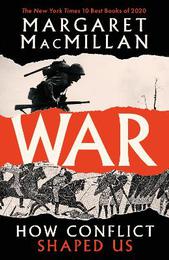
|
War: How Conflict Shaped Us
Hardback
Main Details
| Title |
War: How Conflict Shaped Us
|
| Authors and Contributors |
By (author) Professor Margaret MacMillan
|
| Physical Properties |
| Format:Hardback | | Pages:336 | | Dimensions(mm): Height 238,Width 160 |
|
| Category/Genre | Military history |
|---|
| ISBN/Barcode |
9781788162562
|
| Classifications | Dewey:303.66 |
|---|
| Audience | | Tertiary Education (US: College) | | Professional & Vocational | | General | |
|---|
| Edition |
Main
|
| Illustrations |
16 page plate section
|
|
Publishing Details |
| Publisher |
Profile Books Ltd
|
| Imprint |
Profile Books Ltd
|
| Publication Date |
8 October 2020 |
| Publication Country |
United Kingdom
|
Description
The time since the Second World War has been seen by some as the longest uninterrupted period of harmony in human history: the 'long peace', as Stephen Pinker called it. But despite this, there has been a military conflict ongoing every year since 1945. The same can be said for every century of recorded history. Is war, therefore, an essential part of being human? In War, Professor Margaret MacMillan explores the deep links between society and war and the questions they raise. We learn when war began - whether among early homo sapiens or later, as we began to organise ourselves into tribes and settle in communities. We see the ways in which war reflects changing societies and how war has brought change - for better and worse. Economies, science, technology, medicine, culture: all are instrumental in war and have been shaped by it - without conflict it we might not have had penicillin, female emancipation, radar or rockets. Throughout history, writers, artists, film-makers, playwrights, and composers have been inspired by war - whether to condemn, exalt or simply puzzle about it. If we are never to be rid of war, how should we think about it and what does that mean for peace?
Author Biography
Margaret MacMillan is Emeritus Professor of International History, University of Oxford and Professor of History, University of Toronto. She is the author of Women and the Raj and the international bestsellers Nixon in China and Peacemakers, which won the 2002 Samuel Johnson Prize, and The War that Ended Peace, The Uses and Abuses of History and History's People, all published by Profile.
ReviewsOnly an historian with MacMillan's comprehensive knowledge, command of sources, clarity of thought, and artful writing could succeed so brilliantly with one volume on this sweeping topic. -- Robert B. Zoellick, former President of the World Bank This important book teaches us to realize the impressive way in which war invades every aspect of our society. Read and learn. -- George Shultz War is awful but somehow alluring, dreaded but, too often, welcomed. On these pages, with her vast gifts as an historian and story teller, Margaret MacMillan explains why. -- Evan Thomas, author of * Ike's Bluff * Readable and convincing ... yet another tour de force from Margaret MacMillan -- Professor Joseph S. Nye, Jr., Harvard University and author of * Do Morals Matter? * MacMillan's book ranges briskly and fluently across the entire history of human warfare ... she is a bracingly unsentimental observer with an admirable eye for detail. -- Dominic Sandbrook * Sunday Times * a lively piece of non-academic writing that brings a sense of urgency to the study of war and society. It reads, though, as if spoken. History-telling, above all the history of battle, is an oral tradition, and MacMillan is its master. The book is full of the kind of detail designed not only to make a point, but also to keep the listener alert. She might just as well have been telling these stories and their curiosities across a campfire before battle ... excellent historical expose -- Roger Boyes * The Times * Elegant ... War is not a historical aberration best forgotten but a clear and ever-present danger for humanity. It merits continuing historical inquiry and political discussion. War is as good a place as any from which to start -- John Thornhill * FT * brilliant and stimulating -- Martin Chilton * Independent * The writing about war in history is sometimes formidable but forbidding (Homer), sometimes rambling but romantic (Churchill), sometimes searching but searing (Erich Maria Remarque). It seldom is energetic and engaging. This book is. * Globe and Mail * [A] richly eclectic discussion of how culture and society have been molded by warfare throughout history ... MacMillan writes with enormous ease, and practically every page of this book is interesting, even entertaining. * New York Times * MacMillan cogently explains via colourful historical anecdotes how understanding war means we can also understand our emotions, our ideas and our capacity for good - as well as for cruelty. -- Ben East * Observer * delightfully readable. The author wears the immense scholarship underpinning the book lightly. Her writing style is crisp and there is an enviable clarity of thought. This should come as no surprise. MacMillan's previous books, notably Peacemakers, her magisterial account of the 1919 Versailles conference, are critically acclaimed and have won several important awards. War is another fine achievement, and should be widely read by those wishing to understand how armed conflict has shaped, and continues to shape, the world in which we live today. -- Robert Gerwarth * Irish Times *
|